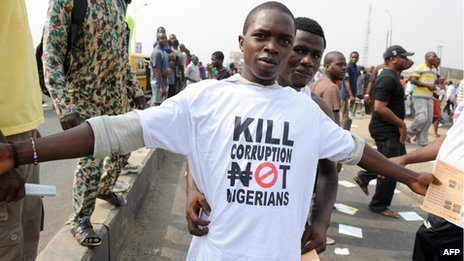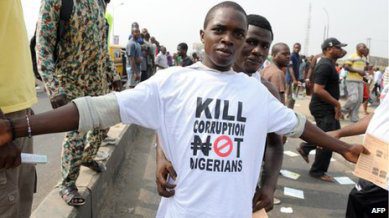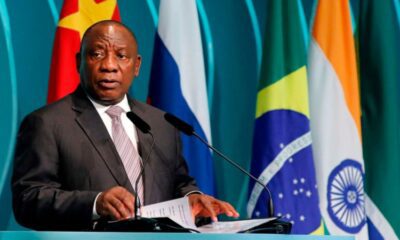Letters
Why Nigeria must battle corruption -By Monday Ameh

Corruption, according to Transparency International, the global anti-graft watchdog, is the abuse of entrusted power for private gain. Corruption, no doubt, is a monstrous cankerworm that has eaten deep into the fabric of our national lives, manifesting in the educational, health and transport sectors and even religious bodies are not excluded from the vices either.
The adverse effect of corruption in our dear country cannot be overemphasized. As a matter of fact, many Nigerians have been sent to their early graves due to the pandemic corruption. In corruption lies the core of Nigeria’s national conflicts, which manifest in poor leadership, bad roads, collapsed infrastructures, extreme poverty in the midst of immense oil wealth; militancy, very recently terrorism, lack of electricity, woeful healthcare administration and poor education.
It was in realization of the devastating effect of corruption which is a global phenomenon and the danger it portends, that the General Assembly of the United Nations by its resolution 58/4 of October 31, 2003 at its Headquarters in New York set aside December 9 of every year as International Anti-Corruption Day in order to raise awareness about corruption and the role of the United Nations Convention against Corruption.
The Convention read in part: The United Nations is: “Concerned about the seriousness of problems and threats posed by corruption to the stability and security of societies, undermining the institutions and values of democracy, ethical values and justice and jeopardizing sustainable development and the rule of law.
“Promote and strengthen measures to prevent and combat corruption more efficiently and effectively… promote, facilitate and support international cooperation and technical assistance in the prevention of and fight against corruption …and promote integrity, accountability and proper management of public affairs and public property….”
Activities lined up to mark this day worldwide include:
•Musicals and plays to publicize the anti-corruption message
•Essay competitions on corruption
•Keynote speeches by people who are victims of corruption or those who are in the fore front of leading the fight against the menace and;
•The dissemination of posters, flyers and other corruption enlightenment and education materials. Meanwhile, Nigeria is among the 140 nation that signed the Convention document, while she ratified it on December 14, 2004.
There is no doubt that the fight against corruption in Nigeria is gathering momentum. Perhaps that is the reason for the nations improvement in the just released 2014 Transparency International report in which the country was ranked as the 39th most corrupt country in the world. According to this year’s Corruption Perceptions Index, Nigeria garnered 27 scores from 100 marks to place 136th from the total of 175 countries surveyed.
It is heartwarming that Nigeria is making steady improvement in the CPI ranking judging by our not too cheering ranking from 1996 when Nigeria was ranked as the MOST corrupt country in the world.
This unenviable position was retained in 1997 and 2000 respectively. But Nigeria stepped backwards to the position of the second most corrupt nation in the world and occupied that spot for four consecutive years in 1999, 2001, 2002 and 2003. In 2004 and 2005 respectively, Nigeria was ranked as the third most corrupt country in the world, while in 1998, Nigeria was ranked the fourth most corrupt country. However it left the topmost spot in 2006 as she was ranked the fifth most corrupt country in the world.
In the 2007 and 2008 ranking, Nigeria was ranked the ninth and 16th most corrupt country in the world, while in 1999, it was ranked 130th, with a score of 2.5, and in 2010 ranking it slid to the 134th position with Corruption Perception Index of 2.4. In 2011, Nigeria placed 143rd. In the 2012 ranking, the country clinched the 139th position and in 2013, it ranked 144th out of 175 countries surveyed.
It is not yet uhuru. Nigerians must join hands with the anti-graft agencies in the country to break the corruption chain.
The media as the fourth estate of the realm must continue to hold leaders accountable to the citizens by exposing every act of corruption through in-depth investigative journalism.
Civil Societies Organization must serve as whistle blowers in unearthing and reporting every form of corruption to the anti-graft agencies.
On the part of the judiciary, it should handle corruption cases with dispatch and met out adequate sanctions to anyone found guilty of corruption charges.
Religious leaders must urge their adherents to imbibe sound moral values and pay less emphasis on prosperity sermons because without the cross, there will be no crown and hard work they say, pays.
Traditional rulers and higher institutions of learning should desist from giving/conferring chieftaincy titles and honourary doctorate degrees on people of questionable characters.
As we approach the 2015 general election, the electorate must be vigilant and avoid the mistake of voting corrupt politicians to office as doing so will be counter-productive.
This is also calling on members of the National Assembly should expedite action on the amendment of the ICPC and EFCC Acts laid before it since. The lawmakers should equally take their oversight function with all the seriousness it deserves in the coming year as it will go a long way in reducing incidences of corruption from our system.
Citizens should take advantage of the Freedom of Information Act by demanding for accountability.
It is also pertinent that government should set up Tribunal or Special Anti Corruption Court from the regular courts to handle corruption cases as the delay in our courts nowadays owing to frequent adjournment does not augur well for the fight against corruption. Justice delayed, they say, is justice denied.
At this juncture, ICPC and EFCC must be commended for their relentless effort at leading the crusade against corruption, financial crimes and other related offences through their investigation and prosecution of corrupt Nigerians since their establishment. More importantly, for embarking on vigorous public enlightenment and education advocacies through seminars and workshops across Nigeria which are aimed at educating the public on and against bribery, corruption, financial crimes as well as fostering public support in combating the menace.
Nevertheless, there is room for improvement, and as we step into year 2015 with hope, the two agencies should re-double their efforts for the onerous task of eradicating corruption from our nation.
The existing synergy between anti-graft agencies like ICPC, EFCC, Code of Conduct Bureau and other law enforcement agencies should be deepened since all of them are working towards making Nigeria a better place for us all and generations yet unborn, because the success of one is the success of all, and the failure of one is invariably the failure of all.
On the part of government, ICPC, Code of Conduct Bureau and EFCC should get their funding through the consolidated revenue account to guarantee their true independence.
With the dwindling oil revenue and the attendants austerity measures being put in place by government, the fight against corruption must be stepped up so as to checkmate the looting of our scarce resources.
All hands must be on deck to ensure that corruption, which is the bane of our development, is eradicated totally, or reduced to the barest minimum. Then, life will be meaningful. Sanity would have been restored in our political, socio-economic life as a nation, resulting in sustainable development which is the hallmark of democracy. The achievement of the Millennium Development Goals as well as the Transformation Agenda of the present administration will be actualized.
As Nigeria joins the rest of the world today to commemorate the International Anti-Corruption Day with the theme: “Break the corruption chain,” this is calling on Nigerians to say “NO” to Corruption as our “NO” indeed “COUNTS”. Corruption Must Go!





















